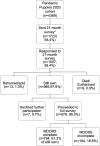Lasting lockdown love? Problem behaviour and pandemic and non-pandemic related risk factors influencing the owner-dog relationship in a UK cohort of dogs reaching early adulthood
- PMID: 39937701
- PMCID: PMC11819559
- DOI: 10.1371/journal.pone.0316166
Lasting lockdown love? Problem behaviour and pandemic and non-pandemic related risk factors influencing the owner-dog relationship in a UK cohort of dogs reaching early adulthood
Abstract
The owner-dog relationship is a critical component of sustained dog ownership. Increased understanding of risk factors for weak owner-dog relationships can identify owner-dog dyads at higher risk of poor welfare outcomes, including dog relinquishment and euthanasia. The internationally documented boom in puppy acquisition during the COVID-19 pandemic led to welfare concerns for this cohort of dogs, including impulsive purchasing of puppies to unsuitable homes, increased supply of puppies from poor-welfare sources, and deficits in early-life experiences for puppies. Combined, these changes were feared to lead to problem behaviours, weak owner-dog relationships and increased future relinquishment in this uniquely vulnerable generation. The Pandemic Puppies project longitudinally studied dogs bought as puppies aged < 16-weeks old during the 2020 phase of the COVID-19 pandemic by collecting owner-completed data during puppyhood and as adults. This study aimed to investigate factors associated with the owner-dog relationship in early-adulthood via a cross-sectional analysis of a subset of Pandemic Puppies data (n = 794). When dogs were 21-months old owners completed the Monash Dog-Owner Relationship Scale (MDORS), from which the Perceived Emotional Closeness (Closeness) and Perceived Costs subscales were established as reliable in this sample and were used as outcome variables in multivariable analyses to explore risk factors such as health, behaviour, and acquisition-related variables. Problem behaviours, including those related to lack of control, fear, separation, and aggression were the predominant risk factors associated with increased Perceived Costs score. The presence of most problem behaviours was not associated with reduced Closeness, suggesting a potential source of emotional conflict for owners. However, owners of dogs showing aggressive behaviours had lower Closeness scores. Puppy acquisitions explicitly motivated by the pandemic were associated with increased Perceived Costs. Support interventions targeted at owners of dogs with problem behaviours are of high importance if positive owner-dog relationships are to be maintained.
Copyright: © 2025 Merritt et al. This is an open access article distributed under the terms of the Creative Commons Attribution License, which permits unrestricted use, distribution, and reproduction in any medium, provided the original author and source are credited.
Conflict of interest statement
The authors have declared that no competing interests exist.
Figures



References
-
- Cambridge Dictionary. Essential British English. 2024 [cited 2024 Sep 24]. Welfare. Available from: https://dictionary.cambridge.org/dictionary/essential-british-english/we...
-
- Cobb ML, Otto CM, Fine AH. The Animal Welfare Science of Working Dogs: Current Perspectives on Recent Advances and Future Directions. Front Vet Sci [Internet]. 2021. Oct 15 [cited 2024 Apr 22];8. Available from: https://www.frontiersin.org/articles/10.3389/fvets.2021.666898 - DOI - PMC - PubMed
-
- Rohlf VI, Bennett PC, Toukhsati S, Coleman G. Beliefs Underlying Dog Owners’ Health Care Behaviors: Results from a Large, Self-Selected, Internet Sample. Anthrozoös. 2012. Jun 1;25(2):171–85.
MeSH terms
LinkOut - more resources
Full Text Sources
Medical

